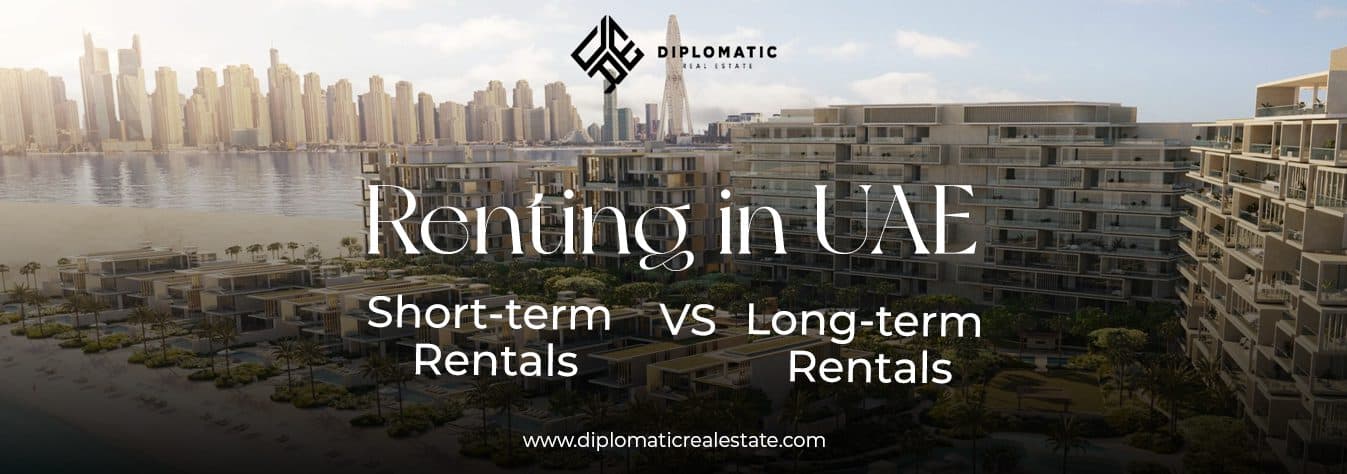When it comes to renting a property in the UAE, you have two main options: short-term rentals or long-term rentals.
Every alternative offers distinct advantages and disadvantages, and picking between the two depends mainly on your personal requirements, budget, and lifestyle choices.
To assist you in making an informed choice, we’ll go into great detail on both long-term and short-term rentals in this extensive blog post.
Short-term Rentals
Short-term rentals, also known as vacation rentals or holiday homes, are properties that are rented out for a short period, usually ranging from a few days to a few months.
These rentals are popular among tourists, business travellers, and those who are in the UAE for a temporary stay or relocation.
Benefits
- Flexibility: One of the biggest advantages of short-term rentals is the flexibility they offer. You can rent a property for the exact duration you need, whether it’s a week, a month, or a few months. This makes short-term rentals an excellent choice for those with fluctuating travel plans or uncertain schedules.
- Variety of options: Short-term rentals come in a wide range of options, including apartments, villas, townhouses, and even entire houses. This variety allows you to choose the type of accommodation that best suits your needs, preferences, and group size. Whether you’re travelling solo, as a couple, or with a large family or group, you’re likely to find a suitable short-term rental option.
- Fully furnished and equipped: Most short-term rentals are fully furnished and equipped with all the necessary amenities, such as kitchen appliances, bedding, towels, and basic household items. This can be especially convenient if you’re travelling light or don’t want to invest in furniture and household items for a temporary stay.
- Access to amenities: Many short-term rentals offer access to various amenities like pools, gyms, and recreational facilities, which can enhance your overall experience and make your stay more enjoyable.
Drawbacks
- Higher costs: Short-term rentals typically cost more per night or per month than long-term rentals. This is because they cater to a different market and often include additional services, amenities, and a premium for the flexibility they offer.
- Limited availability during peak seasons: During peak seasons or popular events, short-term rentals can be in high demand, making it more difficult to find suitable accommodation at a reasonable price.
- Lack of long-term stability: Short-term rentals do not provide the stability and sense of permanence that comes with a long-term rental. You may need to move frequently, which can be inconvenient, disruptive, and stressful, especially for families or those with children.
Cost
The cost of short-term rentals can vary widely depending on factors such as location, property size, amenities, and season.
Generally, you can expect to pay anywhere from AED 200 to AED 1,000 or more per night for a short-term rental in the UAE. However, the cost can be significantly higher in popular areas or during peak seasons.
Long-term Rentals
Long-term rentals, also known as annual rentals or leases, are properties that are rented out for an extended period, typically one year or more.
These rentals are popular among expatriates, families, and those who plan to stay in the UAE for an extended period or have established roots in the country.
Benefits
- Lower costs: Lower costs: One of the most significant advantages of long-term rentals is their affordability. Longer leases can result in better rates, which can save you a lot of money over time. The monthly cost is typically less than short-term rentals.
- Stability and permanence: Long-term rentals provide a sense of stability and permanence, which can be important for families, individuals, or those who want to establish roots in the UAE. You don’t have to worry about moving frequently, which can be particularly beneficial for children’s education and family life.
- Opportunity to personalize: With a long-term rental, you have the opportunity to personalize the space and make it feel more like home. You can hang artwork, paint walls, or make minor renovations (with the landlord’s approval), allowing you to create a comfortable and personalized living environment.
- Access to residential communities: Many long-term rental properties are located in residential communities with shared amenities such as parks, playgrounds, swimming pools, and gyms. This can be particularly appealing for families or those seeking a community-oriented living experience.
Drawbacks
- Less flexibility: Long-term rentals typically require a minimum commitment of one year, which can be a disadvantage if your plans change unexpectedly or you need to relocate sooner. Breaking a long-term lease can sometimes result in penalties or loss of the security deposit.
- Limited options: The availability of long-term rentals can be more limited than short-term rentals, especially in popular areas or during peak seasons. This can make it challenging to find a suitable property that meets your preferences and requirements.
- Potential for rent increases: Landlords may increase the rent at the end of the lease term, which can be a financial burden if the increase is significant. This uncertainty can make long-term budgeting and planning more difficult.
- Responsibility for maintenance: In some cases, tenants may be responsible for minor maintenance tasks and repairs, which can be time-consuming and costly.
Cost
The cost of long-term rentals in the UAE can vary significantly depending on factors such as location, property size, amenities, and the specific community or development.
On average, you can expect to pay anywhere from AED 30,000 to AED 200,000 or more per year for a long-term rental in the UAE.
However, it’s important to note that costs can be higher or lower depending on the specific property and location.
Legal and Regulatory Aspects
When renting in the UAE, it’s crucial to be aware of the legal and regulatory aspects involved to ensure a smooth and hassle-free experience. Here are some key points to keep in mind:
- Tenancy contracts: Both short-term and long-term rentals require a tenancy contract that outlines the terms and conditions of the rental agreement. Make sure to read and understand the contract thoroughly before signing, and seek legal advice if necessary.
- Real estate agents and property management companies: It is advisable to work with licensed real estate agents or reputable property management companies to ensure a smoother rental process, avoid potential issues, and have a knowledgeable professional to guide you through the process.
- Licensing requirements: In some areas of the UAE, such as Dubai, short-term rentals may require a specific license or permit. It’s essential to familiarize yourself with the local regulations and comply with them to avoid any legal issues or penalties.
- Rental laws and tenant rights: Each emirate in the UAE has its own set of rental laws and regulations that govern tenant rights, security deposits, rental increases, and eviction procedures. Educate yourself on these laws to ensure you understand your rights and obligations as a tenant.
Tips for Choosing the Right Rental Option
Choosing between a short-term rental and a long-term rental can be a difficult decision, as both options have their own advantages and disadvantages. Here are some tips to help you make the right choice:
- Determine your length of stay: One of the primary factors to consider is how long you plan to stay in the UAE. If it’s for a short period, such as a few weeks or months, a short-term rental may be more suitable. If you plan to stay for an extended period, a long-term rental could be a better option in terms of cost savings and stability.
- Consider your budget: Short-term rentals can be more expensive on a per-night or per-month basis, so if you’re on a tight budget, a long-term rental may be more affordable in the long run. However, if you have a flexible budget and value the convenience and amenities of short-term rentals, the higher cost may be justifiable.
- Evaluate your lifestyle and needs: Think about your lifestyle and the type of accommodation that would best suit your needs. Do you prefer the flexibility and variety of short-term rentals, or do you value the stability, sense of community, and personalization that comes with a long-term rental? Consider factors such as your work schedule, family situation, and preferred living environment.
- Research and compare options: Take the time to research and compare different rental options in your desired location. Look at online listings, consult with real estate agents, and read reviews from previous tenants. This will give you a better understanding of the market and help you find the best deal.
- Consider additional costs: When evaluating the cost of a rental, don’t forget to factor in additional expenses such as utilities, internet, and any applicable service charges or community fees. These additional costs can add up quickly and impact your overall budget.
- Plan for the future: If you anticipate staying in the UAE for an extended period, it may be worth considering a long-term rental from the outset, even if your initial stay is shorter. This can provide you with more stability and potentially save you money in the long run, as opposed to renewing short-term rentals multiple times.
Conclusion
When it comes to renting in the UAE, both short-term and long-term rentals have their own unique set of advantages and disadvantages. Short-term rentals offer flexibility, a variety of options, and fully furnished accommodations, but they can be more expensive and lack long-term stability.
Long-term rentals, on the other hand, provide a sense of permanence, lower costs, and the opportunity to personalize your living space, but they may offer less flexibility and limited options.
The decision between a short-term and long-term rental ultimately comes down to your individual requirements, financial situation, preferred way of life, and the length of your stay in the United Arab Emirates.
Finding the rental choice that best fits your needs can be achieved by giving serious thought to the elements covered in this blog post, doing extensive research, and speaking with real estate experts.
Remember, it’s always advisable to familiarize yourself with the legal and regulatory aspects of renting in the UAE, understand your rights and obligations as a tenant, and work with reputable real estate agents or property management companies to ensure a smooth and hassle-free rental experience.
Also Read: How to get leads for real estate in Dubai?


